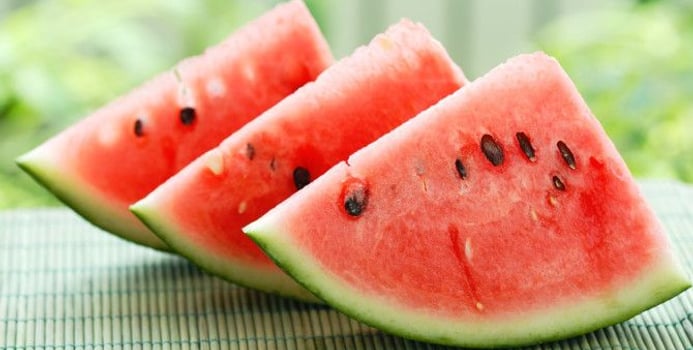Lots of people love the unique flavor and texture of the watermelon--popular at picnics and other summertime events, this hard-shelled fruit is relatively easy to ship, and often comes to the local table from faraway places, neatly preserved and ready to eat. But for some who are looking critically at their diet, it's important to know just what is in this juicy melon.
Natural Food
Watermelon is a natural food. That means it is going to be one of those items that you can eat without reading an ingredients list half a page long. Because this fruit is generally sold unprocessed, it's easier to detail what is in it and what isn't. You can also skip a lot of the potentially nasty stuff in preservatives that are used in so many complex foods on the market. The value of fresh produce, including both fruits and vegetables, is a big part of what causes dieters to look at natural foods like watermelon in order to control the real ingredients that go into their bodies.
Watermelon also rates well on some scales that involve general nutrition. When it comes to some of the worst offenders in terms of harmful foods, watermelon is free of almost all of the most dangerous elements, including saturated fats, cholesterol, and sodium. All three of these are things to watch out for in heavy diets containing meats, cheeses, and processed foods. By contrast, the light, watery flesh of the melon is a low calorie, low fat food. A cup of watermelon balls or chunks has only 46 calories. That's half of the calories in the same amount of pineapple and only a quarter of the calories in a cup of mashed bananas.
Essential Nutrients
What watermelon does have is a lot of the essential nutrients that you need for a healthy, balanced diet. Potassium, vitamin A and vitamin C are a few of the good benefits that watermelon brings to the table. There's also a gram of dietary fiber in the above mentioned one cup serving. There is, however, one thing in watermelon that should give dieters pause: sugar. Almost all of the calories in watermelon come from sugar; that cup of watermelon includes 10 grams.
Overall, most nutritionists agree that leaving heavier desserts like cakes and cookies in favor of fresh watermelon is a good start to a brighter, healthier future. The only drawback to this summertime favorite is figuring out where to spit the seeds. As far as storage, watermelon will keep for quite a while in your refrigerator. One common way to keep a larger melon is to cut half into small slices, and shrink wrap the other half until it is needed.
Watermelon is great on its own or in fruit salads. New seedless varieties make this fruit easier to serve, but many like to stick with the traditional seeded melon for that familiar sweet, fresh taste. Think about making this fresh fruit a part of a regular diet, especially in the summertime when it is widely available.



